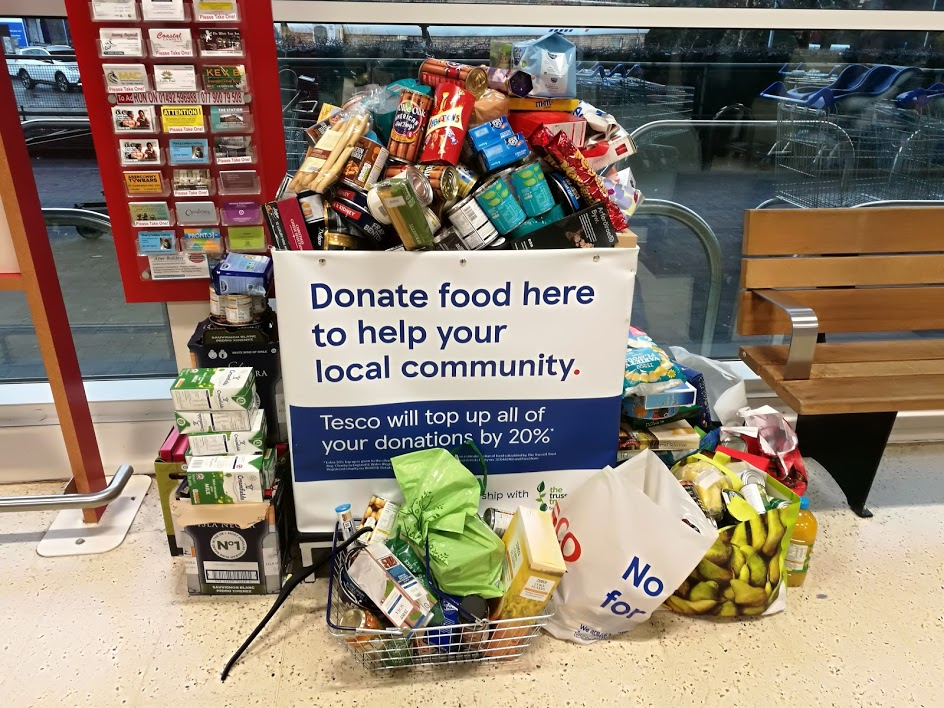Jingle-all-the-way…to the food bank
The end of November typically sees the full-force of voluntary action from our nation’s largest provider of emergency food aid, the Trussell Trust, working within some of our largest retailers. As the brigade of volunteers don their festive jumpers and hats and turn out in force to encourage as many shoppers as possible to donate, the public has developed a certain indifference to their plea. This is not a case of ‘bah-humbug’, as public donations (Trussell Trust & Independent) are what keep shelves of food banks filled; it is a case of how normal this situation has become.
Tiina Silvasti in her research on the food banks of her native Social-Democratic Finland talks about ‘normalising the abnormal’ how food poverty has become part of everyday-life. Graham Riches in Canada too encourages us to understand the process of normalisation of food banks and how they have become an accepted avenue for people struggling with poverty. Riches addresses how food banks became normalised across both the USA and Canada; most notably in recognition that poverty was increasing. In response came the emergence of a national provider (for example USA’s Feeding America), bringing together local emergency food aid organisations.
Furthermore, this national provider would start to make partnership linkages with food redistribution organisations and retailers. In early 2018 in the UK Asda, the Trussell Trust and Fareshare entered into a £20 million three-year partnership programme “to help a million people out of food poverty” (Trussell Trust, 2018). In doing so, the ‘Fight Hunger Create Change’ programme aims to support the development of Trussell Trust Foodbanks across the UK “to expand their services to help more people in crisis”. This is an admirable position, no one would doubt.
Or should we doubt this? Because recent figures from the Trussell Trust have shown the steepest ever increase in foodbank use over the last five years! Therefore, should we be questioning this as a reformulation of comparable approaches that took hold in the USA and Canada over the last 40 years that encouraged the entrenchment of food banks as an accepted welfare response?
Perhaps we are mirroring what happened in the US and Canada as poverty becomes an endemic issue in the UK. Yes, it is true that food banks (both the Trussell Trust and independent) are there to provide help when times are tough. However, as Wolfgang Seibel (1989) pointed out in his work on the voluntary sector; there are some issues that governments can’t (or don’t want to) solve so they shunt them over to the third-sector. Politically - problem solved. Ronson and Caraher (2016) have rendered this same position to understand how the food bank (as a collective within the ‘Big Society’) resemble a shunted issue of rising (food) poverty.
Governments since 2010 have simultaneously produced and then turned their back on rising poverty, destitution, homelessness and food bank use in a neoliberal mantra of rolling-back the state. So, it is understandable that the Trussell Trust and other food banks have stepped in to fill this void.
As most food banks are organised through churches, they feel it part of their religious/moral duty and ministry to help (May, 2014). However, in doing so they have also created a system where they can’t step back, as their hand is being forced morally to provide – it has become their duty. In my research with food bank volunteers I was told on several occasions – well if we do not provide for these people, who will?
I acknowledge my admiration of food banks across the UK, especially as they go into over-drive for donations. Christmas is a difficult and stressful time even for the fortunate and I cannot imagine the pain of having to use a food bank at Christmas; like so many of the respondents to my research had. I also acknowledge the difficulty of the political/moral/ethical situation - as they are damned if they do (to provide indefinitely) and equally damned (morally) if they don’t.
This brings me back to Christmas collection food drives; and my main point. We have reached a level of Normalisation in this desperate situation, where food banks and their collections have become so normalised that they no longer raise an eyebrow. Yearlong baskets situated at the end of the tills prompting regular donations. School collections at Harvest time. Universities with collection boxes for their local food bank, some have even needing to start their own for students and staff alike .
As we enter political over-drive of the forthcoming December 12th election; canvassing, door-knocking, and all manner of electioneering conducted. We need to be calling on all governments to pledge a real end to austerity, an end to welfare conditionality and ultimately, resolving the structural issues that have created food banks in the first place.
Bio
Dr Dave Beck is a lecturer of Social Policy at the University of Salford. His recent research focused on the growth of the food banking landscape of Wales, analysing the political growth of the emergency food aid sector.
Dave has several articles available through The Conversation website touching on the normalisation of food poverty and child food poverty. Plus, a forthcoming peer-reviewed chapter written for the United Nations Encyclopaedia of Sustainable Development Goals 2 ‘Hidden Hunger in the UK’ (2019); and ‘Poverty in Wales’, a chapter in the third edition of the British Association of Social Workers book 'Social Policy for Social Welfare Practice in Wales -New Directions'. Forthcoming (2020).
